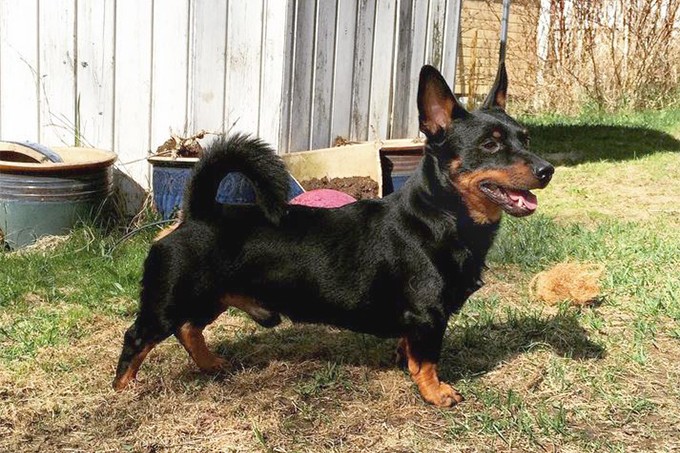🐶
Lancashire Heeler
Dogs Breed
toy
Size
12
Years Life Expectancy
1
Years to Maturity

About Lancashire Heeler
The Lancashire Heeler is a tiny dog breed originally developed for cattle herding, ratting, driving cattle to market.. Weighing 3-6 kg and standing 25-30 cm at the shoulder, and typical lifespan 12-12 years (average about 12). Temperament: Clever, Friendly and Alert.
Detailed Overview
Overview: The Lancashire Heeler is a toy dog breed originally developed for cattle herding, ratting, driving cattle to market.. This overview synthesizes structured characteristics (size, temperament, lifespan) into a practical ownership profile without relying on external narrative sources.
Physical & Growth: Typical adult weight 3-6 kg and height 25-30 cm at the shoulder. Growth plates generally approach closure near the maturity age (~0.8 yrs), after which sustained conditioning and joint-friendly exercise patterns are emphasized. Senior life stage typically begins around 10 yrs, prompting adjustments in caloric density, joint monitoring, and wellness screening intervals.
Temperament & Trainability: Temperament commonly described as clever, friendly, alert and intelligent when appropriately socialized. Consistent early social exposure, reward-based reinforcement, and structured boundaries help channel instinctive drives productively. Short, focused sessions reinforce responsiveness while reducing overstimulation.
Exercise & Enrichment: Recommended baseline is 30-60 minutes of varied activity. Blend aerobic activity (walks, controlled fetch, swimming where appropriate) with cognitive tasks (target training, scent games, puzzle feeders). Periodic rest intervals and surface diversity (grass, stable footing) support musculoskeletal resilience.
Health & Preventive Care: Lifespan 12-12 years (avg ~12). Primary preventive care focuses on maintaining lean body condition, structured exercise, and periodic screening as the dog ages. Maintaining a lean body condition score and monitoring subtle gait changes or behavioral shifts allows earlier veterinary consultation. Dental hygiene (brushing or validated chews) and parasite prevention further support longevity.
Household Suitability: Suited to smaller living spaces if mental needs are met. A moderate energy profile allows flexibility—balanced sessions of exercise and calm indoor time generally keep the dog content. Thoughtful scheduling of training, exercise, rest, and calm handling routines helps sustain behavioral stability. Equipment basics include a properly fitted flat collar or harness, enrichment rotation (chew variety, scent articles), and an appropriately sized resting area that balances joint support with temperature regulation.
Care Summary: Integrating measured physical exercise, progressive training progression, nutritional portion control, and proactive wellness screening forms a comprehensive stewardship model for the Lancashire Heeler. Adjust protocols responsively across life stages—from juvenile learning windows through senior comfort adaptations—to optimize wellbeing.
Physical & Growth: Typical adult weight 3-6 kg and height 25-30 cm at the shoulder. Growth plates generally approach closure near the maturity age (~0.8 yrs), after which sustained conditioning and joint-friendly exercise patterns are emphasized. Senior life stage typically begins around 10 yrs, prompting adjustments in caloric density, joint monitoring, and wellness screening intervals.
Temperament & Trainability: Temperament commonly described as clever, friendly, alert and intelligent when appropriately socialized. Consistent early social exposure, reward-based reinforcement, and structured boundaries help channel instinctive drives productively. Short, focused sessions reinforce responsiveness while reducing overstimulation.
Exercise & Enrichment: Recommended baseline is 30-60 minutes of varied activity. Blend aerobic activity (walks, controlled fetch, swimming where appropriate) with cognitive tasks (target training, scent games, puzzle feeders). Periodic rest intervals and surface diversity (grass, stable footing) support musculoskeletal resilience.
Health & Preventive Care: Lifespan 12-12 years (avg ~12). Primary preventive care focuses on maintaining lean body condition, structured exercise, and periodic screening as the dog ages. Maintaining a lean body condition score and monitoring subtle gait changes or behavioral shifts allows earlier veterinary consultation. Dental hygiene (brushing or validated chews) and parasite prevention further support longevity.
Household Suitability: Suited to smaller living spaces if mental needs are met. A moderate energy profile allows flexibility—balanced sessions of exercise and calm indoor time generally keep the dog content. Thoughtful scheduling of training, exercise, rest, and calm handling routines helps sustain behavioral stability. Equipment basics include a properly fitted flat collar or harness, enrichment rotation (chew variety, scent articles), and an appropriately sized resting area that balances joint support with temperature regulation.
Care Summary: Integrating measured physical exercise, progressive training progression, nutritional portion control, and proactive wellness screening forms a comprehensive stewardship model for the Lancashire Heeler. Adjust protocols responsively across life stages—from juvenile learning windows through senior comfort adaptations—to optimize wellbeing.
Temperament
CleverFriendlyAlertIntelligent
Health Considerations
Quick Facts
Category:Dogs
Size:toy
Weight:3 - 6 kg
Height:25 - 30 cm
Life Span:12 years
Maturity:1 years
Senior Age:10 years
Additional Information
citations json:N/A
lifespan range:12-12
reference image id:S1RGml5Em
source schema version:5
training end age months:13
training start age months:2